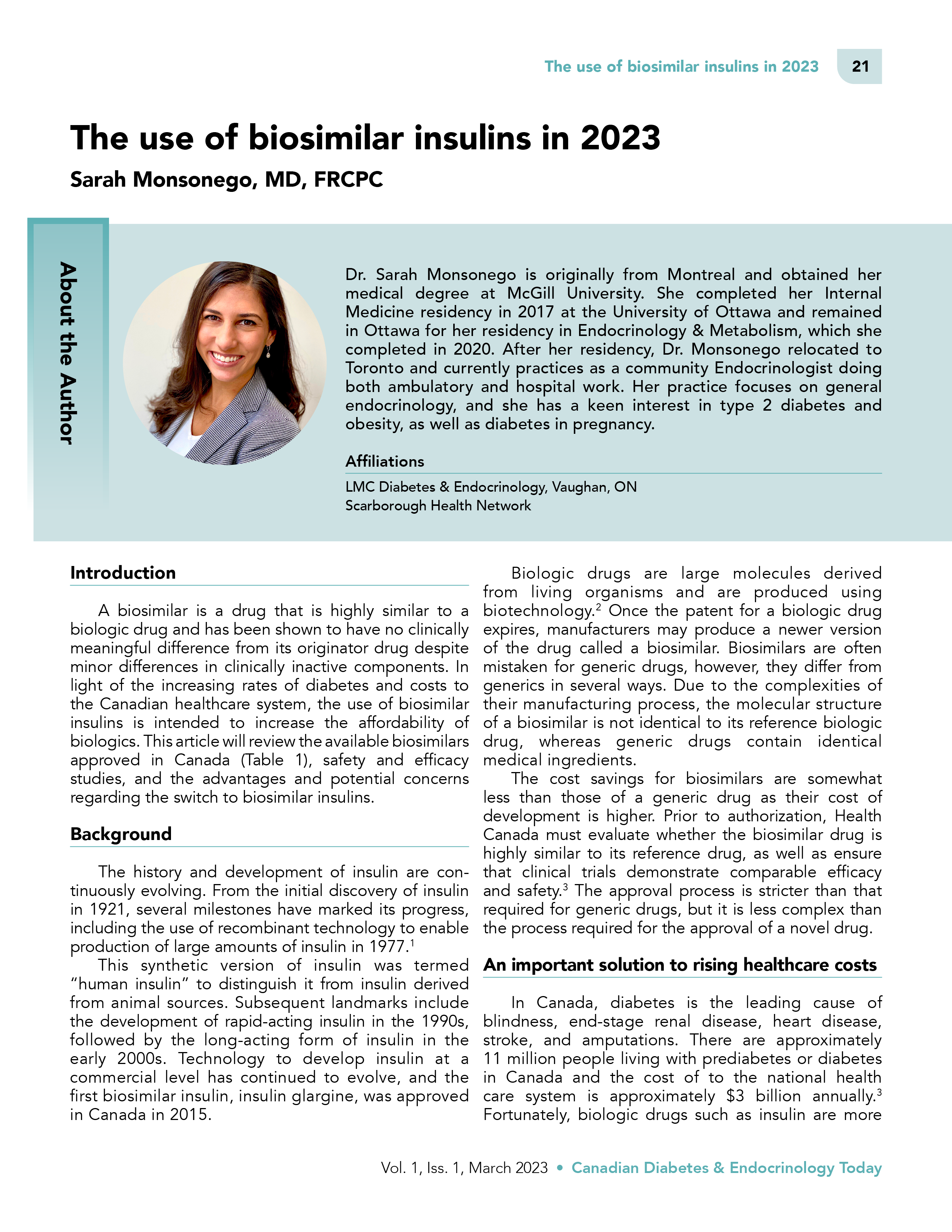The Use of Biosimilar Insulins in 2023
DOI:
https://doi.org/10.58931/cdet.2023.118Abstract
A biosimilar is a drug that is highly similar to a biologic drug and has been shown to have no clinically meaningful difference from its originator drug despite minor differences in clinically inactive components. In light of the increasing rates of diabetes and costs to the Canadian healthcare system, the use of biosimilar insulins is intended to increase the affordability of biologics. This article will review the available biosimilars approved in Canada, safety and efficacy studies, and the advantages and potential concerns regarding the switch to biosimilar insulins.
References
Tibaldi JM. Evolution of insulin: from human to analog. Am J Med. 2014 Oct;127(10 Suppl):S25-38. DOI: https://doi.org/10.1016/j.amjmed.2014.07.005
Fact Sheet: Biosimilar Biologic Drugs. Health Canada. http://www.hc-sc.gc.ca/dhp-mps/brgtherap/activit/fs-fi/fs-fi_seb-pbu_07-2006-eng.php.
Diabetes, Biologic Drugs, and Biosimilar Insulins: A Position Statement. Diabetes Canada, 2020.
Keon, J. “Op-ed: The case for an Ontario biosimilar switching policy.” Biosimilars Canada, November 2021. https://biosimilarscanada.ca/news/news-releases.
Joshi SR, et al. Biosimilars and interchangeable biosimilars: facts every prescriber, payor, and patient should know. Insulins perspective. Expert Opin Biol Th. 2022:1-12. DOI: https://doi.org/10.1080/14712598.2022.2112664
Blevins, TC, et al. Efficacy and safety of LY2963016 insulin glargine compared with insulin glargine (Lantus®) in patients with type 1 diabetes in a randomized controlled trial: the ELEMENT 1 study. Diabetes Obes Metab. 2015;17(8):726-733. DOI: https://doi.org/10.1111/dom.12496
Rosenstock J, et al. Similar efficacy and safety of LY2963016 insulin glargine and insulin glargine (Lantus®) in patients with type 2 diabetes who were insulin-naïve or previously treated with insulin glargine: a randomized, double-blind controlled trial (the ELEMENT 2 study). Diabetes Obes Metab 2015;17(8):734-741. DOI: https://doi.org/10.1111/dom.12482
Garg SK, et al. Efficacy and safety of biosimilar SAR342434 insulin lispro in adults with type 1 diabetes also using insulin glargine—SORELLA 1 study. Diabetes Technol Ther. 2017;19(9):516-526. DOI: https://doi.org/10.1089/dia.2017.0117
Derwahl, K-M, et al. Efficacy and safety of biosimilar SAR342434 insulin lispro in adults with type 2 diabetes, also using insulin glargine: SORELLA 2 study. Diabetes Technol Ther. 2018;20(1): 49-58. DOI: https://doi.org/10.1089/dia.2017.0281
Garg, S K, et al. Efficacy and safety of insulin aspart biosimilar SAR341402 versus originator insulin aspart in people with diabetes treated for 26 weeks with multiple daily injections in combination with insulin glargine: a randomized open-label trial (GEMELLI 1). Diabetes Technol Ther. 2020;222):85-95. DOI: https://doi.org/10.1089/dia.2019.0382
Blevins, TC, et al. Efficacy and safety of MYL-1501D vs insulin glargine in patients with type 1 diabetes after 52 weeks: results of the INSTRIDE 1 phase III study. Diabetes Obes Metab. 2018;20(8): 1944-1950. DOI: https://doi.org/10.1111/dom.13322
Blevins, TC, et al. Efficacy and safety of MYL-1501D versus insulin glargine in patients with type 2 diabetes after 24 weeks: results of the phase III INSTRIDE 2 study. Diabetes Obes Metab. 2019;21(1): 129-135. DOI: https://doi.org/10.1111/dom.13495
Shah, V N, et al. Efficacy, safety, and immunogenicity of insulin aspart biosimilar SAR341402 compared with originator insulin aspart in adults with diabetes (GEMELLI 1): a subgroup analysis by prior type of mealtime insulin. Diabetes Ther. 2021;12.2:557-568. DOI: https://doi.org/10.1007/s13300-020-00992-x
Blevins TC, Barve A, Raiter Y, Aubonnet P, Athalye S, Sun B, et al. Efficacy and safety of MYL-1501D versus insulin glargine in people with type 1 diabetes mellitus: Results of the INSTRIDE 3 phase 3 switch study. Diabetes Obes Metab. 2020 Mar;22(3):365-372. DOI: https://doi.org/10.1111/dom.13904
Tieu C, Lucas EJ, DePaola M, Rosman L, Alexander GC. Efficacy and safety of biosimilar insulins compared to their reference products: A systematic review. 2018. PLoS ONE 13(4):e0195012 DOI: https://doi.org/10.1371/journal.pone.0195012
Yang, L-J, et al. Efficacy and immunogenicity of insulin biosimilar compared to their reference products: a systematic review and meta-analysis. BMC Endocr Disord. 2022;22(1):1-11. DOI: https://doi.org/10.1186/s12902-022-00944-5
Thrasher J, et al. Diabetes technol Ther. 2020;22(9): 666-673. DOI: https://doi.org/10.1089/dia.2019.0446
Wilsdon T, et al. Biosimilars: a global roadmap for policy sustainability. Charles River Associates. 2022.
Rezk MF, Pieper B. Treatment outcomes with biosimilars: be aware of the nocebo effect. Rheumatol Ther. 2017 Oct 14;4(2):209-18. DOI: https://doi.org/10.1007/s40744-017-0085-z
Morris Dd. Biosimilar insulins: an in-depth guide. J Diabetes Nurse. 2022;26(1):1-9.

Published
How to Cite
Issue
Section
License
Copyright (c) 2023 Canadian Diabetes & Endocrinology Today

This work is licensed under a Creative Commons Attribution-NonCommercial-NoDerivatives 4.0 International License.
